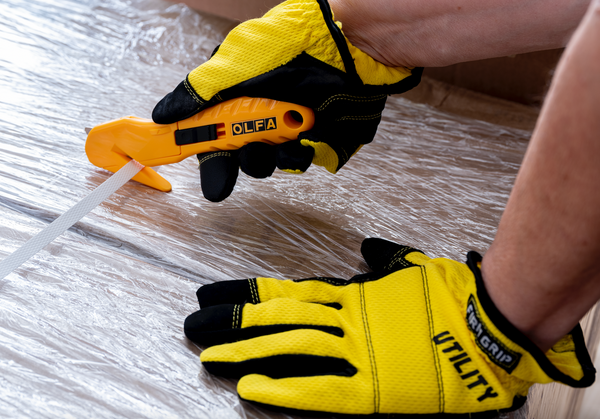
How to Keep Your Hands Safe at Work
When you think about professionals at work, the human hand is the most used tool at any job site. From snapping the blade of your utility knife, to cleaning up debris, your hands and fingers are the tools you use every day. But with that comes the danger of getting hurt. In 2020 alone, there were over 148,000 hand injuries reported at work, and over 56% of them were due to cuts, lacerations and punctures.
To help you safeguard your hands at work, we’ve handpicked our recommended hand safety tips. We've included help from some of our most experienced users— the OLFA Pro All Star team. Rest assured you can keep your hands protected for a lifetime of use!
- Wear The Right Equipment
Although this may seem obvious, wearing the appropriate equipment is the first step to ensuring your hands are safe at work.
"It's important to choose the appropriate protective equipment as you perform the task at hand. No matter if you're an experienced professional or a DIY, an abundance of caution never killed anyone", said OLFA Pro All-Star Roy Scott (@vintageaxeworks), a successful business owner and creator of unique axes. For this reason, gloves are a must-have. Choosing the right gloves isn’t one fit for all. Base your selection on the hazards that are present: the job task, work conditions, and the duration of use. Never use torn or damaged gloves. Always make sure you inspect prior to each use.

(Photo credit: Roy Scott)
- Stay Alert
Always stay alert and focused on keeping your hands safe – not just at the start of work or a task. Whatever you’re working on, it’s important to be aware of what you’re touching and where your hands are going. To maintain awareness, avoid using headphones. Also don't put your hands in your pocket, make phone calls, or read texts while working. Part of being alert also involves recognizing the hazards of the job. Whether working with sharp objects, cutting tools, or chemicals, always be aware of your surroundings. Experienced carpenter Chris Milton (@modernmilt) agrees: "The key to knife safety is definitely focus, along with a clean work area and thinking before you act. When you're too comfortable, accidents will happen— I may or may not be speaking form experience."
- Consider the Ergonomics
Using tools that are not ergonomic is one major contributor to hand overuse injuries. To avoid that, select tools that are ergonomic for your hand with the right size, low weight, and grip. Ergonomically designed tools are ones that fit well in your hand, and allow you to work with comfort, no matter the task at hand. Based on users’ insights and continuous testing, OLFA Hand Tools are manufactured with ergonomics in mind. We want to ensure that professionals using these tools can reduce daily hand stress, decreasing injuries and fatigue.
- Do Your Daily Housekeeping
When it comes to your hands, cleaning up the work space around you is key to ensuring safety at work. From excess tools to construction debris, clear everything away before you start working. One way to help you ease your housekeeping is using OLFA Blade Disposal Cans to safely store your used blades. By keeping your used blades in one designated place, you avoid accidental exposure as you work. When cleaning, never use your bare hands to sweep up discarded materials or other sharp objects.
(Photo credit: Chris Milton)
- Address It, Don’t Avoid It
When working with cutting tools, there is always a risk of injury. Talking about safety guidelines with your colleagues can help make these safety tips more memorable to everyone. The more open communication you create, the more everyone can minimize hazardous situations. By sharing your insights and how you approach your day at work with your crew, you can make everyone aware of these safety routines. This will help prevent hand injuries in the workplace.
Keep following these tips, so you can improve safety at work. Remember to always protect your most valuable tool– your hands.




